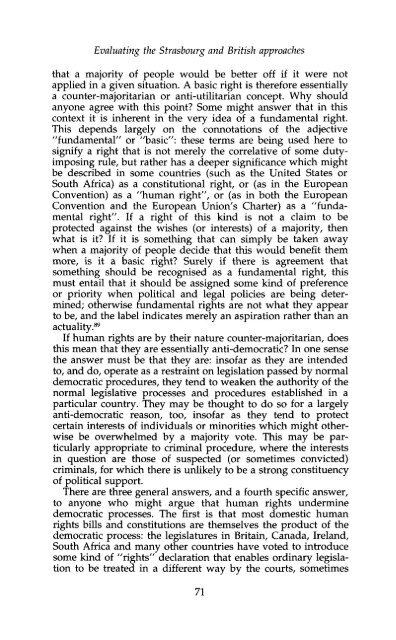Human Rights, Serious Crime and Criminal Procedure - College of ...
Human Rights, Serious Crime and Criminal Procedure - College of ...
Human Rights, Serious Crime and Criminal Procedure - College of ...
- No tags were found...
You also want an ePaper? Increase the reach of your titles
YUMPU automatically turns print PDFs into web optimized ePapers that Google loves.
Evaluating the Strasbourg <strong>and</strong> British approachesthat a majority <strong>of</strong> people would be better <strong>of</strong>f if it were notapplied in a given situation. A basic right is therefore essentiallya counter-majoritarian or anti-utilitarian concept. Why shouldanyone agree with this point? Some might answer that in thiscontext it is inherent in the very idea <strong>of</strong> a fundamental right.This depends largely on the connotations <strong>of</strong> the adjective"fundamental" or "basic": these terms are being used here tosignify a right that is not merely the correlative <strong>of</strong> some dutyimposingrule, but rather has a deeper significance which mightbe described in some countries (such as the United States orSouth Africa) as a constitutional right, or (as in the EuropeanConvention) as a "human right", or (as in both the EuropeanConvention <strong>and</strong> the European Union's Charter) as a "fundamentalright". If a right <strong>of</strong> this kind is not a claim to beprotected against the wishes (or interests) <strong>of</strong> a majority, thenwhat is it? If it is something that can simply be taken awaywhen a majority <strong>of</strong> people decide that this would benefit themmore, is it a basic right? Surely if there is agreement thatsomething should be recognised as a fundamental right, thismust entail that it should be assigned some kind <strong>of</strong> preferenceor priority when political <strong>and</strong> legal policies are being determined;otherwise fundamental rights are not what they appearto be, <strong>and</strong> the label indicates merely an aspiration rather than anactuality. 89If human rights are by their nature counter-majoritarian, doesthis mean that they are essentially anti-democratic? In one sensethe answer must be that they are: ins<strong>of</strong>ar as they are intendedto, <strong>and</strong> do, operate as a restraint on legislation passed by normaldemocratic procedures, they tend to weaken the authority <strong>of</strong> thenormal legislative processes <strong>and</strong> procedures established in aparticular country. They may be thought to do so for a largelyanti-democratic reason, too, ins<strong>of</strong>ar as they tend to protectcertain interests <strong>of</strong> individuals or minorities which might otherwisebe overwhelmed by a majority vote. This may be particularlyappropriate to criminal procedure, where the interestsin question are those <strong>of</strong> suspected (or sometimes convicted)criminals, for which there is unlikely to be a strong constituency<strong>of</strong> political support.There are three general answers, <strong>and</strong> a fourth specific answer,to anyone who might argue that human rights underminedemocratic processes. The first is that most domestic humanrights bills <strong>and</strong> constitutions are themselves the product <strong>of</strong> thedemocratic process: the legislatures in Britain, Canada, Irel<strong>and</strong>,South Africa <strong>and</strong> many other countries have voted to introducesome kind <strong>of</strong> "rights" declaration that enables ordinary legislationto be treated in a different way by the courts, sometimes71
















